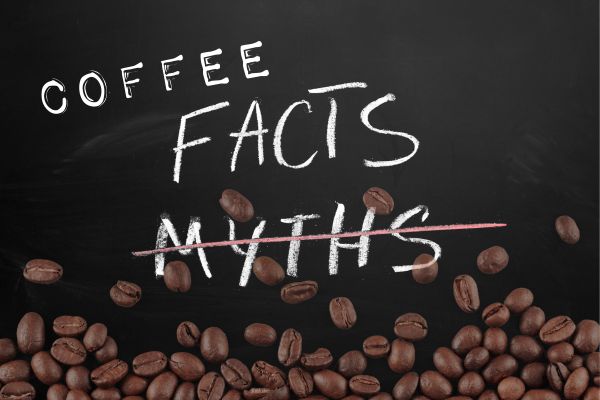Debunking Common Coffee Myths
Ever scroll through your feed and see someone raving about their "butter coffee" or stressing about "mycotoxins" in their daily grind? Let's be real, the world of coffee can get a little…extra. As someone who lives and breathes that delicious morning coffee ritual, I'm here to spill the beans (pun intended!) and clear up some common misconceptions.
Myth #1: Butter Coffee is Your Weight Loss Magic Bullet (Spoiler: It's Not!)
You've seen the hype: coffee, grass-fed butter, and MCT oil – the ultimate keto coffee for shedding pounds and boosting brainpower. Sounds appealing, right? But here's the lowdown:
While the high-fat content can make you feel full, leading you to eat less for a short time, it's not a magic fat-burning potion. That "extra energy" often comes from your body burning the added fat, not necessarily your stored body fat. Plus, a typical Bulletproof brew can pack anywhere from 230-500 calories! If you're adding that on top of your regular breakfast, you're looking at potential weight gain, not loss. For sustainable weight loss coffee solutions, focus on a balanced diet and regular exercise. Your wallet and your waistline will thank you.
While coffee itself is known to increase alertness and attention due to caffeine, there's no scientific evidence that adding butter and MCT oil offers additional, special cognitive benefits or sustained energy beyond what black coffee provides. Studies have shown no significant improvements in cognition, alertness, or energy levels from butter coffee compared to regular coffee.
Myth #2: Mycotoxins are Hiding in Your Favorite Specialty Coffee (Chill Out, They're Not!)
This one pops up a lot, especially when certain brands try to scare you into buying their "mycotoxin-free" coffee. Mycotoxins are toxins produced by molds, and yes, molds can grow on coffee beans if conditions are terrible.
This claim, popularized by the creator of Bulletproof coffee, suggests that most commercial coffee is contaminated with harmful mycotoxins. However, studies show that good agricultural and post-harvest practices, along with the coffee roasting process, effectively prevent and reduce mycotoxin contamination in commercially available coffee to levels that pose no risk to consumers.
The coffee roasting process itself is a superhero, significantly reducing any trace of mycotoxins that might be present. So, no need to stress about those invisible baddies in your beloved espresso or pour over coffee.

Myth #3: Dark Roast Coffee Has More Caffeine (Nope!)
You might think dark roast coffee packs more of a punch than light roast, but that's actually a pretty big myth. See, caffeine is super stable, and roasting doesn't really mess with how much of it is in each coffee bean. So, whether your beans are light and bright or dark and bold, they've got pretty much the same amount of caffeine.
Here's why it gets a bit confusing:
- Scooping vs. Weighing: If you scoop your coffee, dark roast beans are lighter and puffier (they expand more when roasted). So, a scoop of dark roast will have fewer actual beans than a scoop of light roast. And since each bean has roughly the same caffeine, that scoop of light roast might end up giving you a tiny bit more jolt. But if you're weighing your coffee (which is what serious coffee geeks do!), then you're using the same amount of coffee, and the caffeine will be basically identical.
- Flavor Tricks: Dark roasts have a really strong, intense flavor. That often gets mistaken for being "stronger" in terms of caffeine, but it's just flavor intensity, not buzz level.
So, the real deal is: the type of coffee bean (Robusta beans have way more caffeine than Arabica), how you brew it, and how much coffee you use are the real game-changers when it comes to how much caffeine ends up in your mug.
Myth #4: Coffee Dehydrates You (Mostly False!)
For years, we've heard that coffee is a diuretic and will leave you parched. While caffeine does have a mild diuretic effect, studies show that regular coffee consumption doesn't lead to dehydration in people who drink it routinely. Your body adapts! Just make sure to stay hydrated throughout the day with good old water, as you should anyway.
Your Perfect Cup, Your Way
So, next time you're brewing up your favorite coffee beans, remember to enjoy it without the extra baggage of unproven claims or unnecessary worries. Focus on good quality fresh coffee, experiment with different coffee brewing methods, and savor that rich flavor. Because in the end, the best cup of coffee is the one you enjoy most!

